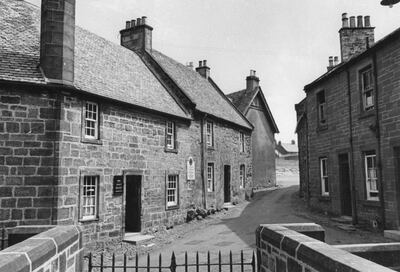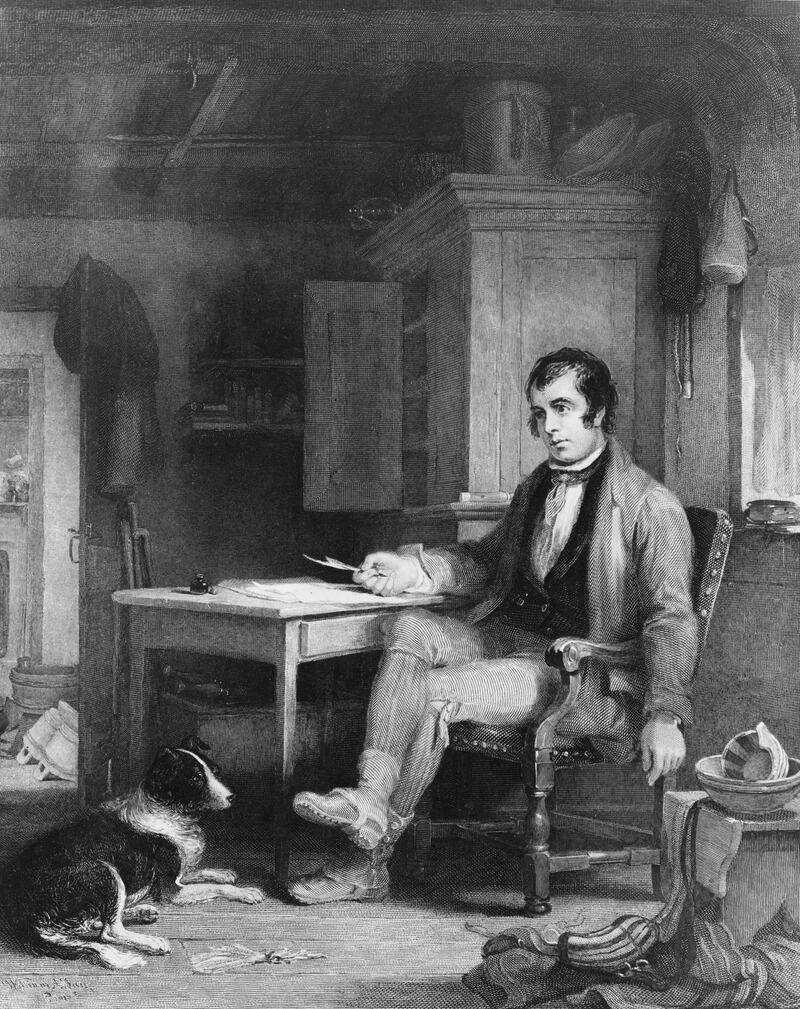Throughout Scotland on Friday, and across the globe, including in the UAE, the birth of Robert Burns will be toasted with a traditional supper of haggis, neeps (turnips) and tatties (potatoes), as well as poems and songs which, despite their 18th-century origins, continue to charm, entertain and inspire.
Scotland's national bard was born to humble beginnings amid the simple and tranquil surroundings of rural Scotland in 1759. By then, more than half a century had passed since the (1707) Act of Union had brought the kingdoms of England and Scotland together to form Great Britain.
His early life
The young Burns began life immersed in the honest toil that came with his father’s profession as a tenant farmer. It was an unremarkable start, but soon this ploughman would write his name across the stars, announcing himself to an adoring public as a poet and songwriter par excellence.
"If he's not Scotland's greatest poet, and he is certainly among those, I would argue that he is Scotland's greatest songwriter," says Gerard Carruthers, co-director of the Centre for Robert Burns Studies at the University of Glasgow.
"His songs have worked both lyrically and musically, in the same way as [Beatles songwriters] John Lennon's and Paul McCartney's songs worked brilliantly."
A poet of the people
Written mainly in the Scots dialect, Burns's work retains the ability to provoke humour and touch the heart to this day. From love song A Red, Red Rose to Auld Lang Syne, the popular tune sung around the world on New Year's Eve as the clock strikes midnight, Burns's compositions remain an ever-present force in our modern age. The song has been covered by everyone from Elvis Presley to Mariah Carey. Indeed, renowned as he was for his love affairs, much of Burns's work aches with emotion. For example, Ae Fond Kiss, a song about love and loss – which begins with the immortal words "Ae fond kiss, and then we sever; Ae farewell, and then forever" – paints a poignant picture of romantic heartbreak that would not look out of place in the 21st century.
Because of the timelessness of his words, Burns has long cemented his place as a global cultural figure. From his birthplace of Alloway, Ayrshire, in the west of Scotland, Burns and his work have blazed a trail across the world.
"He is genuinely a poet of the people," Carruthers says of the man who fathered nine children with his on-off partner Jean Armour. "He's a great conjugator of emotions and the emotional wrench."
David Sibbald, a Burns aficionado and after-dinner speaker from Scotland says: "He appeals to all nations, rather than being a parochial Scot writing in the Scottish language." He adds that as Scots emigrated to far away lands, which included their role in building the British Empire, they carried with them their love of Burns.
A man ahead of his time
Seen as the everyman – or A Man's a Man for A'That to quote his egalitarian work of 1795 – Burns has been appropriated in the United States, and even today's Russia, after being adopted by the former Soviet Union. In 1956, the communist USSR issued stamps bearing his image – and in contemporary Russia, Burns is taught in schools. "There are two Russians who email me and they are translating [Burns's work] still," Sibbald says.
In the US, escaped slave-turned-writer and orator Frederick Douglass visited Burns's elderly sister during his 1840s lecture tour of the British Isles, such was his love for Scotland's literary hero. His lyrics have been variously hailed by the great and the good throughout American history, from US Civil War president Abraham Lincoln to legendary singer-songwriter Bob Dylan. The "Great Emancipator" Lincoln was a confirmed fan, but after being asked to give his sentiments on the Scottish bard in 1865, the author of the Gettysburg Address was overwhelmed by the notion: "Thinking of what he has said, I cannot say anything which seems worth saying."
In the 20th century, Nobel Prize-winning American author John Steinbeck took the title of his classic 1937 novella Of Mice and Men from Burns's 1785 work To a Mouse, which includes the lines: "The best laid schemes o' mice an' men / Gang aft agley / An' lea'e us naught but grief an' pain / For promised joy."
Burns experts say that he was also ahead of his time in terms of personal politics.
An advocate for women's rights

Despite the Scottish bard's illicit relationships and his fathering of illegitimate children, Carruthers says there is plenty of evidence that suggests Burns was an advocate of women's rights. "There's no doubt that he was by and large on the side of women's rights," he says. "And you see this in his correspondence, he knows that women have brains at least as good as men."
The French Revolution of 1789 is widely regarded as having fired up Burns’s republican sympathies – a dangerous sentiment to espouse in 18th-century Britain, which feared its own uprising. But Burns’s star, which burned so fittingly bright, was sadly about to burn out prematurely.
And just like a modern-day rock star, his fast living saw him endure numerous recurring bouts of ill health, and he eventually died of endocarditis, inflammation of the heart's inner lining caused by bacteria, in 1796 at the age of just 37, leaving his great body of work to the ages.
Burns night in the UAE

Suzanne McDonald, 46, is a lifestyle consultant from Aberdeen who lives in Dubai. She will be attending the Big Burns Supper at Hilton Dubai Jumeirah, featuring Scottish folk ceilidh band Bahookie. “I think we’ve been to a Big Burns Supper every year since we arrived in the UAE [more than 20 years ago] and I absolutely can’t wait,” she says.
“It’s the ultimate Scottish event – and what I love about the Burns Supper is that it attracts lots of other nationalities to come along and get a taste of Scottish culture. And that’s what I love: whenever you go to a Big Burns Supper, it’s not just Scots who are there – it’s very multicultural these days. “I think it’s a really nice way of celebrating the works that Burns wrote the way that he himself celebrated his life, which was a very short one. He actually enjoyed his life – and was very intelligent for someone of his time – and OK, he was a naughty boy, but I think he genuinely loved women.”

Steve McNally, 49, is chieftain of the Scottish Association in Dubai. The teacher, who is from Dundee, lives in Ras Al Khaimah. He will be attending a Burns Supper on-board the QE2 in Dubai. “We have about 25 different nationalities who are members of the Scottish Association,” he says. “So you don’t have to be Scottish to join. You just have to have a desire and an appreciation to learn about and enjoy Scottish culture.
"So when Scottish people come along to these events, they will very often bring people who aren’t from Scotland, and that’s fabulous. “Rabbie Burns was certainly a bit of a naughty chappie, that’s for sure, but he was clearly full of pride and passion for being Scottish. He obviously had quite a flair of putting these feelings down on paper in such a way that really anybody can enjoy these poems, whether you understand them or not.”





